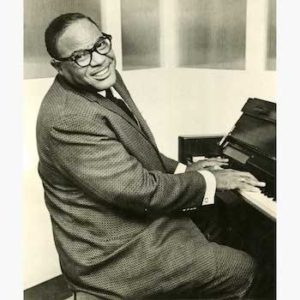
Ivory Joe Hunter
Ivory Joe Hunter was born on this date in 1914. He was a Black singer, songwriter, and pianist.
He was born in Kirbyville, TX, to two musical parents: his mother was a gospel singer, and his father, Dave Hunter, played guitar. A young Hunter took an early interest in music and, in 1933, made his first recording for the Library of Congress. Hunter had his radio show on KFDM in Beaumont, TX, in the early 1940s and eventually became program manager. His first commercial recording was with Johnny Moore's Three Blazers. He started his label, Ivory, and recorded his first song there, his composition, "Blues At Sunrise," which became a regional hit.
In 1942, Hunter moved to the West Coast, where he started Pacific Records. 1947, he recorded for 4 Star and signed with the King label. Two years later, he began to have hits on the R&B charts, such as "I Quit My Pretty Mama" and "Guess Who." On both of these, he was backed by some members of Duke Ellington's band. Hunter then signed with MGM and recorded "I Almost Lost My Mind," which topped the R&B charts in 1950. His "I Need You So" reached number 2 in R&B the same year, and Ivory Joe Hunter had become a hot commodity. He had a smooth delivery and began to be noticed in the country and & western music communities.
By 1954, he had recorded over a hundred songs and moved to the Atlantic label. His first song to cross over to the pop charts was "Since I Met You Baby" (1956). It was his only top forty pop song, reaching as high as number 12. Others that reached the pop charts were "Empty Arms" and "Yes, I Want You." He had a minor hit with "City Lights" in 1959, just before his popularity declined. In the 1950s, white artists frequently made covers of good R&B records; Pat Boone covered Joe's smash R&B hit from 1950, "I Almost Lost My Mind," and had a number-one hit with it in 1956. Hunter returned as a country singer in the late 60s and regularly appeared at the Grand Old Opry.
Sonny James issued a cover of Joe's "Since I Met You, Baby," which topped the country charts in 1970. This paved the way for the issue of the album "The Return Of Ivory Joe Hunter" and Hunter’s appearance at the Monterrey Jazz Festival.
He was a prolific songwriter. Some estimate that he wrote more than 7,000 songs. Two of them, "My Wish Came True" and "Ain't That Loving You Baby," were included in Elvis Presley's top twenty.
Ivory Joe Hunter developed lung cancer and died in Memphis in 1974.
ASCAP Biographical Dictionary
R. R. Bowker Co., Copyright 1980
ISBN 0-8351-1283-1
Heart & Soul:
A Celebration of Black Music Style in America, 1930-1975
by Merlis Davin Seay, Forward by Etta James
Copyright 2002, Billboard Books
ISBN 0-8230-8314-4